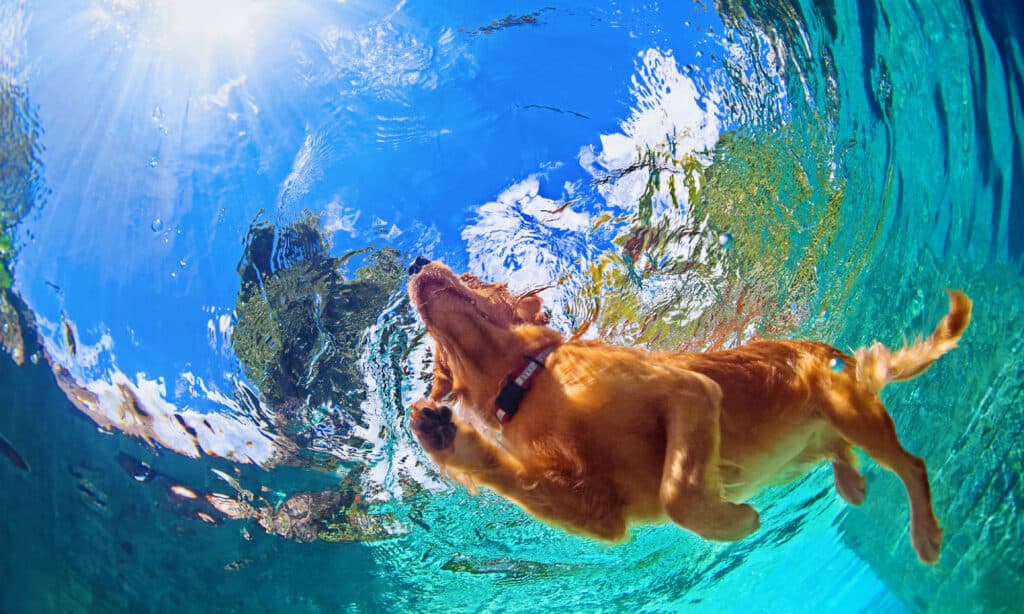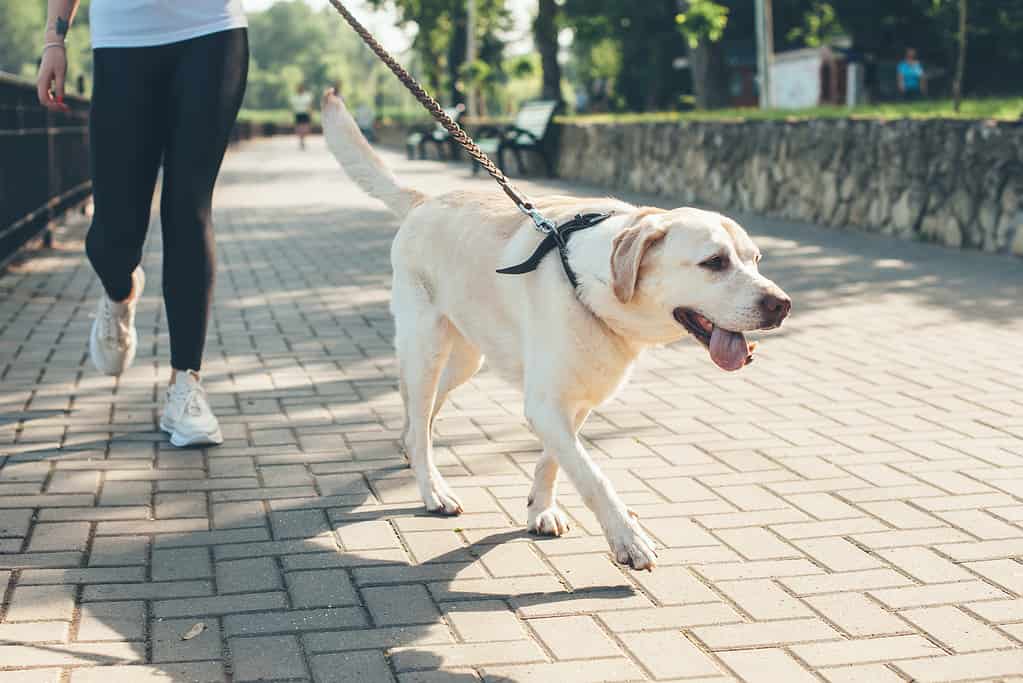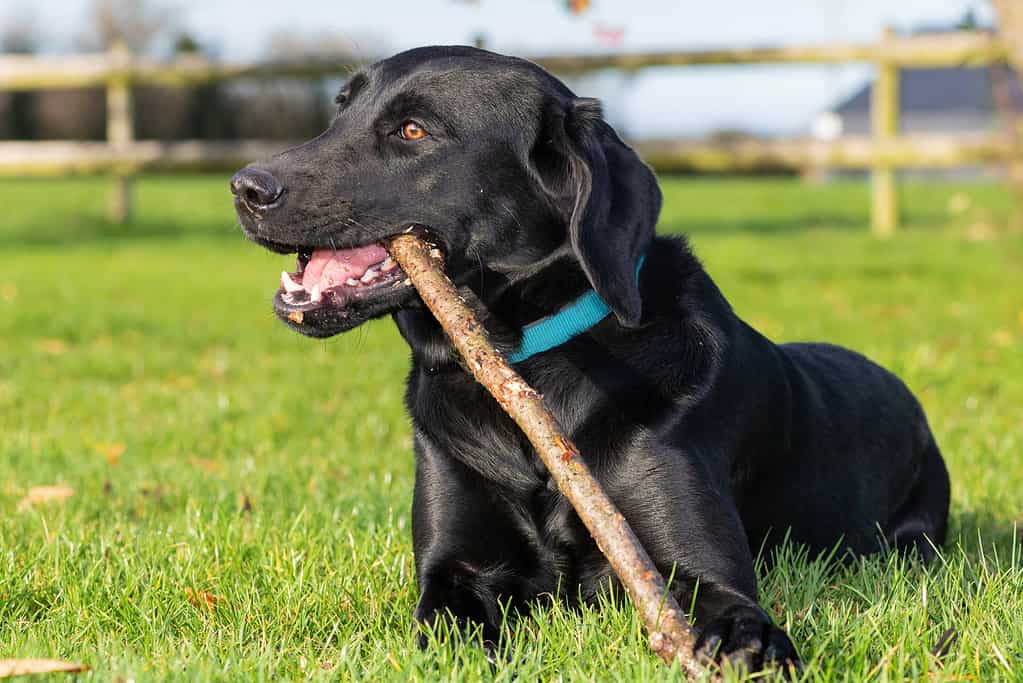Quick Answer:
- The Labrador retriever is ranked 7th on the list of the most intelligent dog breeds out of 190 breeds recognized by the AKC.
- Labrador retrievers can learn up to 270 words, can understand simple counting, and need fewer than five repetitions to learn a new command
The Labrador retriever, also known as the Lab, is a dog species that is often referred to as the perfect family dog. Incredibly loyal, Labs are great for homes with small children. But another factor that makes Labs so compelling is their undeniable intelligence.
According to renowned canine researcher Stanley Coren, the Labrador retriever is placed 7th on the list of the most intelligent dog breeds. Considering there are over 190 dog breeds on the United States AKC list, this is no simple feat!
However, a simple ranking can only determine so much about a dog’s capabilities. So, how smart are Labrador retrievers, really? To determine this, we need to take a deep dive into the many aspects of a Lab’s personality and how its specific characteristics stand out and stand against the many other canine breeds.
Exploring the Intelligence of Labrador Retrievers

Labrador retrievers can take advantage of their double-layered fur coats for many activities, including swimming.
©Denis Moskvinov/Shutterstock.com
Because Labrador retrievers are on the list of the top 10 most intelligent breeds, this means they passed a list of impressive criteria. Among other things, retrievers:
- Have the capacity to learn upwards of 250 words. This determination was based loosely on a prior study involving a border collie named Rico. Rico showed researchers that dogs are able to conduct “fast-track learning” involving language, which is something that was previously believed to apply only to humans and apes.
- Know how to count! While you probably can’t rely on your retriever to help you with your math homework, they do have the capacity to understand very simple digits. With the ability to count up to four and five, your retriever will notice the error of something like 1+1=1.
- Need fewer than five repetitions to learn a new command, easily picking up on new tricks. Average dogs need to hear and follow a new command up to 40 times before learning it, which means your Lab is five times faster than the competition! Not to mention, because of the Labrador retriever’s strong loyalty, they can obey a known command on the first try with a 95% success rate.
Essentially, Stanley Coren determined that intelligent dogs learn at an equivalent rate to a two or two-and-a-half-year-old human child. Dogs, it seems, are much more like us than we could imagine.
Labrador retrievers have some breed-specific skills, too. Much like how a beagle is specially built for scent, Labradors are adept at swimming. Initially bred to be water retrievers, they are incredibly agile when in water. They even have physical qualities that help them rise to the occasion, such as their buoyancy-increasing double-layered coat and webbed toes!
The Cognitive Capabilities of Labrador Retrievers: Understanding Their Problem-Solving Skills and Brain Size
Your Labrador has very high adaptive intelligence. This means that they don’t necessarily need to be taught a trick in order to learn it. This can be beneficial because they catch on quite quickly, but it can also be a nuisance due to their keen ability to act as escape artists. If they see you latch a gate or open a door, for example, it won’t take very long for them to understand how to do it themselves.
In an academic study dedicated to yawn duration in dogs, it was concluded that Labrador retrievers have the second densest brain weight, second only to the Great Dane. These big brains hold a lot of room for learning, as a larger brain size is often associated with a higher capacity to work as service, guide, and rescue dogs.
That being said, brain weight doesn’t have a direct correlation to intelligence. It may allow better performance on certain cognitive tasks, but it isn’t an end-all-be-all determinator. The best way to ensure these big brains stay healthy is with daily attention in the form of exercise, proper nutrition, and cognitive engagement through fun puzzles and play.
Labrador Retrievers’ Learning Aptitude: How Quick and Adaptive Are They?

Labrador retrievers have a lot of energy and need exercise, so be sure to take yours on regular walks.
©iStock.com/Strelciuc Dumitru
As briefly touched on earlier, Labrador retrievers are very fast learners! There’s a reason why you’ll commonly see Labs as service dogs with specially trained jobs, and that reason is that they catch on quite quickly. With such high intelligence in tandem with their large brains, they naturally crave learning.
Among other things, Labradors have a high proficiency in the subjects of language and math. In fact, studies have shown that Labs can even learn tricks and commands in other languages. With a vocabulary of about 250 words, they know 85 more words than the average dog.
During Coren’s trials, the intelligence ratings for dogs were based on two criteria:
- How quickly a dog can learn and respond to unknown commands.
- How quickly a dog can perform a known command.
Since Labradors ended up in 7th place, it’s clear that they are more than capable of accomplishing both of those criteria in no time at all. They are certainly ideal dogs for those looking for an adaptive companion.
Intelligence Ranking: Where Do Labrador Retrievers Stand Among Other Breeds?

The Labrador retriever ranks seventh on the list of top 10 most intelligent dog breeds.
©Ljupco Smokovski/Shutterstock.com
Researcher Stanley Coren determined through his studies that the intelligence of dogs is heavily dependent on the breed for a variety of reasons. He concluded that dogs have three distinct types of intelligence. Instinctive, which is what the dog was bred specifically to do; adaptive, which is how well the dog uses its environment to learn; and working obedience, which is the dog equivalent of “school learning”.
After polling over 200 professional dog show judges, Coren was able to determine a list of what he considered to be the top 10 most intelligent dog breeds. The list is as follows:
- Border Collie
- Poodle
- German Shepherd
- Golden Retriever
- Doberman Pinscher
- Shetland Sheepdog
- Labrador Retriever
- Papillon
- Rottweiler
- Australian Cattle Dog
Something important to note regarding this list is that it is a simple estimate, not a rule to be exclusively followed. For instance, only purebred dogs took part in the trial that led to this list. Meaning there is no way to determine if certain mixed breeds belong on this list. So, no need to feel discouraged if you suspect your Labradoodle belongs on here!
Unlocking Labrador Retrievers’ Intelligence Potential: Training Techniques and Mental Stimulation

Because of their intelligence, boredom strikes Labrador retrievers easily. Play games with them to stimulate their minds.
©iStock.com/Tom Meaker
Before you run to adopt a highly intelligent dog, consider for a moment what that truly means. Coren warns, semi-jokingly, that intelligent dogs have the capacity to be quite manipulative. There are documented instances, he says, of dogs deliberately tricking their owners in order to receive rewards or attention.
In addition to this, your highly-intelligent dog has quite the capability to become easily bored. If you aren’t giving your retriever the mental stimulation that it needs, it might begin to retaliate. This could come in many forms, but the most common is destroying your things. And retrievers are very observant, too, which means they might specifically target certain items!
How Can I Stimulate My Labrador Retriever?
If you wish to avoid this, all you have to do is give your Lab the love and care it needs to be happy and feel fulfilled. There are many options for toys and puzzles built specifically to cater to the needs of intelligent dog breeds.
If you want to have fun while training your Lab’s brain, there is a multitude of fun games you and your furry friend can play together. This includes:
The Cup Game: Much like the popular carnival game, this involves lining three cups in a row and placing a treat under one. After spending a brief moment switching around the cups, ask your pup to choose which cup has the treat underneath. Chances are, they’ll pick up on the trick in no time!
Treat Hand Swap: Similarly, this game involves placing a treat in one hand and switching the treat around both hands behind your back. Then, presenting your hands back to the dog, make it select which hand holds the treat.
Makeshift Fortress: Though this might be teaching your Lab something you don’t want them to know depending on the structure of your home, this game involves building an elaborate barrier that forbids the dog from entering a certain room. See how long it takes your dog to figure out how to overcome the barrier and make its way inside!
The most important thing for a Labrador retriever’s owner is to take the time to engage with them briefly each day to sharpen their skills and make them feel stimulated. When you do this, you’re not only helping them, but you’re helping yourself in the long run. A dog that feels fulfilled is one that will be loyal for life and view you as a valued and respected teacher.
The photo featured at the top of this post is © sanjagrujic/Shutterstock.com
Ready to discover the top 10 cutest dog breeds in the entire world?
How about the fastest dogs, the largest dogs and those that are -- quite frankly -- just the kindest dogs on the planet? Each day, AZ Animals sends out lists just like this to our thousands of email subscribers. And the best part? It's FREE. Join today by entering your email below.
Thank you for reading! Have some feedback for us? Contact the AZ Animals editorial team.






